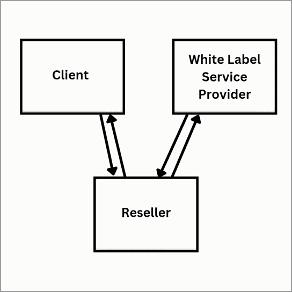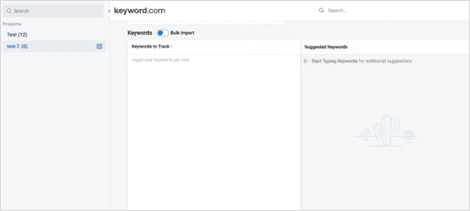You’ve heard about white-label local SEO but wondering how it works and if it’s right for you.
At its core, white-label local SEO involves offering local SEO services, but instead of delivering them directly to clients, you deliver them to another agency under that agency’s brand.
To know if this approach suits your business, ask yourself:
- Are you comfortable working behind the scenes and letting another company take the credit for your work?
- Are you an experienced local SEO expert with a proven track record of delivering results?
- Do you have the systems in place to handle a sudden surge in demand?
- Are you skilled at sourcing and managing top local SEO talent?
If you confidently checked these boxes, you’re well on your way. As you continue reading, you’ll discover why these traits matter and what it takes to build a successful white-label SEO agency.
What is White Label Local SEO?
White-label local SEO allows SEO or digital marketing agencies to offer local SEO services to other agencies under their company’s name. This business model involves three parties:
- White-Label Service Provider: anonymous third party with the expertise, skilled team, and tools to deliver local SEO services.
- Local SEO Reseller: middle-man and white-label partner offering these services to clients under their brand name but outsources the work to the white-label provider.
- End Client: service beneficiary who hires the local SEO reseller and is typically unaware of the white-label service provider’s involvement.
What are the Benefits of Offering White Label Local SEO Services?
The key benefits of white-label local SEO include:
1. It is Cost-Effective
White-label SEO is cost-effective because it allows you to secure clients with minimal marketing. Since the white label provider isn’t responsible for directly acquiring end clients (that’s the reseller agency’s role), you save on marketing, sales, and account management costs. You just focus on delivering the service, reducing your overall operational costs.
While you’ll still need to generate agency leads, the frequency is lower. A few partners consistently bringing in clients can keep you busy, allowing you to grow your business faster without the stress of pursuing individual clients.
2. It Offers Steady and Predictable Work
Your first agency partner will likely upsell your services to existing clients, giving you a strong start. Also, since they have more time for marketing, there’s a higher chance of consistent work.
This predictability leads to stable cash flow, allowing you to optimize operations, improve processes, and allocate resources more effectively. As a result, you’ll achieve better service quality and faster turnaround times, further strengthening your relationships with partner agencies and increasing the likelihood of continued work.
3. You Can Focus on Expertise With Less Direct Client Management
Managing clients directly consumes time and detracts attention from actual local SEO work. However, with white-label services, your partner agency handles client management.
For instance, instead of onboarding every client individually, you can provide your partner agency with onboarding checklists, templates, and documents that help them educate clients on local SEO, set expectations, and answer questions.
Experienced partners can also help define the scope of work and filter client requests, reducing the risk of scope creep and minimizing the need for constant revisions. Even if they’re less experienced, they’ll improve as you continue working together.
Your main responsibility is to collaborate with partners with a strong reputation for client management, allowing you to focus on delivering quality results without getting bogged down by administrative tasks.
4. It Offers Brand Flexibility
Direct local SEO offerings often force you into a specific niche or positioning to stay competitive. However, if this feels limiting and you believe you can excel across various industries, white-label local SEO might be great for you.
With this model, you can offer local services across various industries through partner agencies without actively influencing its branding, marketing, or presentation to end clients.
Types of White-Label Local SEO Services
Examples of white-label local SEO services you can offer include:
1. Local SEO Audit
A local SEO audit is a comprehensive review of a business’s current local SEO performance. It involves examining various aspects such as website content, citation consistency, Google Business Profile setup, and competitors’ local search strategies.
The audit identifies gaps and areas for improvement, such as missing or inaccurate citations, poor on-page optimization, or opportunities to improve local rankings through content updates or link building. The results of the audit provide a roadmap for improving local SEO, helping the client make strategic decisions to boost their local visibility and attract more nearby customers.
An audit should be the first white-label local SEO service you offer clients with existing SEO efforts. You can provide it as a standalone service, free or paid, as part of the initial onboarding process. This helps to establish a baseline, identify immediate issues, and create a tailored white-label SEO strategy.
You may also include regular audits as part of a regular SEO service package. That way, you can constantly reassess and adjust your strategy as needed.
2. Google Business Profile Optimization
It’s safe to say that local SEO is incomplete without a Google Business Profile (GBP). Helping your clients rank in the Google Local Pack and on Google Maps for local keywords increases visibility and drives foot traffic to physical stores.
To achieve this, offer a comprehensive service that includes setting up and verifying GBP pages, completing all sections, adding relevant keywords, and ensuring accurate business information (NAP: Name, Address, Phone).
Don’t overlook GBP posts, as many businesses do. Help your clients create and schedule regular posts to update their local audience on upcoming events or discounts, engage them, and improve visibility.
3. Local Citation Building
After auditing, you may find a business’s NAP information is inconsistent across various online directories, review sites, social media platforms, and other citation sources like Yelp, Yellow Pages, or Bing Places. Sometimes, they may not be listed at all in relevant directories.
Offering a local citation service helps correct these inconsistencies and ensures accurate business citations across all relevant local directories.
4. Local SEO Content Marketing Strategy
Many white-label local SEO agencies’ efforts often stop at directory listings and GBP optimization.
To stand out, offer local content marketing strategy services that boost your client’s SEO visibility index with relevant local content. That said, your partners might question the importance of a strategy when you can just create content and call it a day. In this case, explain that skipping strategy makes it harder to align with client goals and deliver meaningful results.
By presenting a compelling case for local content marketing strategy, you’ll help partners see its value and adopt your process.
5. Local Content and Landing Page Optimization
Offering local content and landing page creation services positions you as a comprehensive white-label local SEO provider, which is especially valuable for clients without an internal content team.
However, many agencies that claim to create local content often produce generic content. To differentiate yourself, tailor your keyword choices to the target region and ensure your content reflects a deep understanding of local geography and culture.
This approach will improve local search visibility, establish your client as a trusted authority in their community, and strengthen their relationships with customers.
6. Review Generation and Management
Managing reviews for your clients is crucial to helping them build a strong online reputation.
When presenting this service to resellers, emphasize that Google considers the quantity and quality of reviews for local rankings, and potential customers use them to decide whether to purchase from your client.
This helps resellers understand the importance of consistent review collection and get clients to cooperate in implementing your strategies.
7. Backlink Building
According to Sterling Sky’s research, building backlinks to Google Business Profile (GBP) may not significantly boost rankings. However, it remains a valuable service for improving website content search visibility.
Don’t build backlinks for the sake of it. Instead, focus on securing high-quality links from websites that are either geographically relevant (such as local businesses, directories, and news sites) or contextually relevant (like industry-specific sites).
8. Local Rank Tracking and White Label Reporting
While tracking and reporting local SEO performance may not be an exclusive white-label SEO service, it’s crucial for proving your efforts to partners and securing their business.
You need to provide real-time performance data such as search rankings, local backlinks, organic traffic, conversions, and other agreed-upon metrics in an understandable white-label report. Therefore, it’s important to choose effective tracking and reporting tools that provide accurate data, support white-label reporting, and allow seamless sharing, like keyword.com.
Keyword.com is a reliable and affordable keyword tracking software for monitoring and reporting local keyword performance without needing a VPN or syncing your GMB. To use it:
- Enter all the keywords you want to track.
- Set up your local rank tracking parameters, such as country, state, city, and zip code, and uncheck the “ignore local listing” option. Then, click “Add Keyword.”
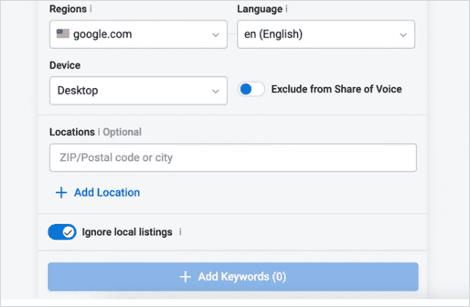
- You’ll have a customized dashboard and breakdown of your keyword performance, including positions, search intent, cost per click, and search features.
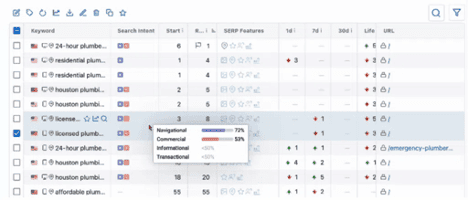
To generate a white-label report:
- Click the three dots in the top-right corner of your dashboard and select “ViewKey Project Settings.”
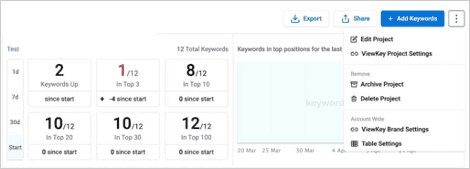
- Adjust the sharing settings for your ViewKey Link dashboard, including adding a password for authorized access.
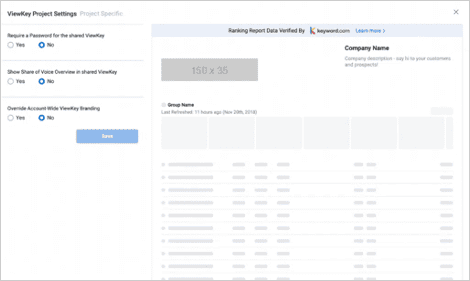
- Customize reports by adding your partner’s company website, logo, and description.
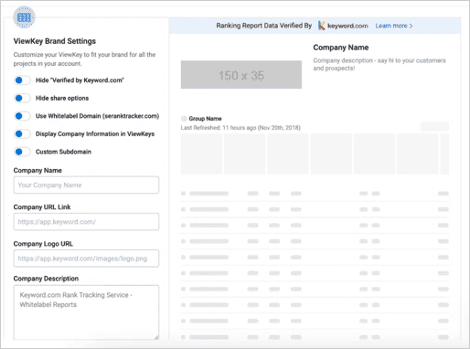
- Return to the share page and copy the ViewKey URL.
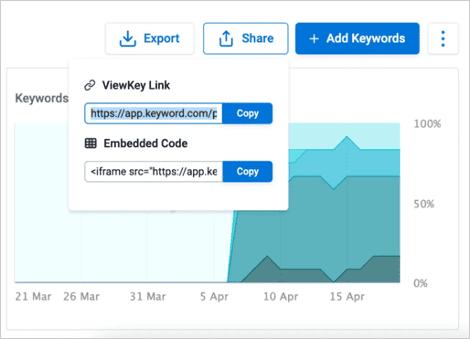
Share the live version of your rank tracking dashboard with your partners so they can view the same data as you.
Keyword.com also includes an AI Visibility Tracker—a feature that shows how often your clients appear in answers on AI-powered search tools like ChatGPT and Perplexity. As more users turn to these platforms for recommendations and local search, this visibility metric gives your partners a competitive edge and helps you demonstrate value beyond traditional rankings.
Use the SEO Share of Voice feature to track keyword performance by topic, and layer in AI visibility metrics to show a more complete view of how your SEO efforts are performing across all channels.
How to Offer White Label Local SEO Services
Now that you know the benefits and examples of white-label local SEO services to offer, how do you successfully kick off your white-label agency? Here are some tips to get you started.
1. Establish Yourself as a Reliable and Transparent Partner
Understand your partners are betting their brand reputation on your services. Beyond expertise, they want reliability and transparency from the first interaction.
To establish trust, focus on the following points:
- Transparent Pricing: your pricing should be visible on your website. This shows you have nothing to hide and helps to manage expectations.
- Responsiveness: how quickly you respond to inquiries reflects your reliability. Slow responses can suggest a lack of interest or poor service, while timely communication builds confidence.
- Understanding their business: take time to understand your partners’ business needs and goals. It shows you care about their success, which reflects well on your commitment to a long-term partnership.
- Honest results and timelines: be upfront about what results you can realistically deliver and how long it will take. By doing so, you avoid undue pressure and conflict in the future.
- Process transparency: explain your processes so partners know how you achieve results. This reassures them that you don’t engage in unethical or black hat SEO practices that could harm their brand in the long run.
- Proactive communication: don’t wait for partners to reach out with issues or questions. Provide regular updates on campaign progress, challenges faced, and how you’re addressing them. This shows engagement and commitment to their success.
Making these efforts will help you build trust with your partners and ensure long-term business relationships.
2. Show Reviews and Case Studies
Potential partners trust reviews and case studies more than any claim you might make about your expertise. Neil Patel, founder of NP Digital, shared how he learned that his track record matters more to clients than the personal brand he spent years building.
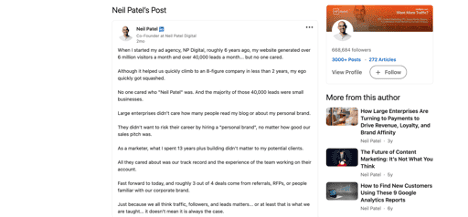
Source: Neil Patel |LinkedIn
Capitalize on this by gathering and making reviews and case studies easily accessible. For instance, The HOTH, a white-label SEO agency, dedicated an entire page to case studies, showcasing the businesses they’ve worked with and their services.
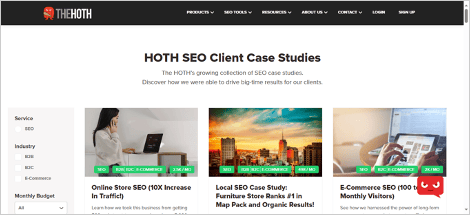
Source: The HOTH
The HOTH also created another page featuring lots of video testimonials.
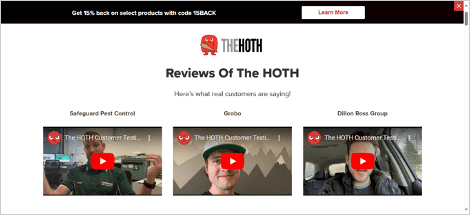
Source: The HOTH
Follow The HOTH’s lead and ensure a simple Google search leads potential clients to plenty of reviews and case studies that show your track record.
For effectiveness, your case studies and reviews should focus on factors that influence client decisions, like local SEO results, expertise, responsiveness, consistency, and reliability. This approach helps potential partners feel at least 50 percent confident about you before even setting up a discovery call.
3. Build a Skilled Team
As Neil Patel’s post above highlights, your team’s expertise is a top factor clients consider when choosing to work with you.
Fares Raouf, a former white-label local SEO agency owner, echoes this sentiment. He emphasizes that sourcing talent is a significant challenge for agencies outsourcing local SEO services, and his success was largely due to his ability to do this effectively.
As advice to potential white-label SEO agency owners, he said:
“If you can source the right talent and are priced right, I’m pretty sure there are hundreds of businesses out there looking to outsource their work at the moment. But in my opinion, it is not so simple to scale an SEO agency, and really talented SEOs are scarce. There was definitely more demand than I could handle or find the right talent for.”
Your ability to assemble a skilled team will set you apart in the market and make your agency highly sought after.
Therefore, aim to recruit only the best talent and showcase their expertise on your website, as That Company!, a white-label SEO agency did here:
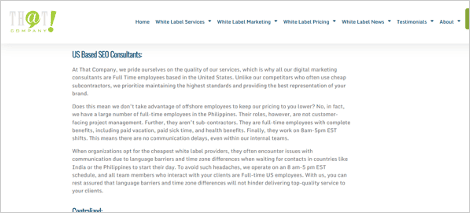
4. Create a Smooth Communication and Reporting Process
Unlike offering direct local SEO, white labeling involves communication with clients through a third party. This reliance can lead to longer response times if there is no system for smooth communication and reporting.
Iva Jovanovic, Head of SEO and Content at Made Online, a digital marketing agency, shares how they manage this process to ensure effective communication:
“To ensure that partner agencies accurately communicate their clients’ needs, we do in-depth onboarding sessions, delving into the client’s goals, target audience, and specific SEO requirements. We give our partners briefing templates to gather the necessary information from their clients and deliver it to us.
Regular check-ins and collaborative strategy sessions help everyone stay on the same page. We also highly value transparency and encourage partners to ask questions or seek clarification when something is unclear.”
To adopt a similar approach, implement standardized communication tools, such as onboarding templates and FAQs, to ensure accurate information transfer.
Set up various communication channels (e.g., emails, calls, project management tools) and encourage partners to use them for assigned purposes. Also, inform them about your reporting schedule and use Keyword.com to automate report delivery with context to prevent delays.
How to Market Your White Label Local SEO Agency
While marketing your white-label local SEO services may not demand the same frequency or intensity as marketing directly to clients, it’s still essential for attracting partners.
So, how do you go about it?
Start by identifying your target audience. One advantage of white-label local SEO is the access to a broad pool of potential clients — agencies specializing in global SEO, PPC, web design, or social media marketing.
However, ensure these agencies have the clients you want to serve. For instance, if you specialize in eCommerce, target agencies that cater to eCommerce brands. Next, generate leads. Creating a website and waiting for inbound leads is fine, but relying on it alone, especially early on, won’t be enough.
Instead, combine it with these proactive strategies:
1. Attend General Marketing Conferences
General marketing conferences attract marketers from various specialties, including decision-makers in agencies that don’t offer local SEO. Attending them is an opportunity to network and pitch your offering.
Secure a speaking opportunity at these conferences to improve your chance of success. By sharing your expertise, you establish credibility and introduce your agency to a room full of potential partners. Deliver value in your presentation, and you may attract interest from attendees.
Note: You can also attend SEO-specific conferences but may face more competition from similar service providers.
2. Leverage the Warm Outbound Sales Tactic
Warm outbound is an alternative to cold selling that requires gaining prospects’ consent before reaching out.
The “honey pot post,” as Ryan Stewart calls it, is a simple and effective warm outbound method on LinkedIn. The idea is to create a valuable resource that solves a problem your potential agency partners face and create a post inviting people to comment if they’d like a copy sent via DM.
For instance, if you’re targeting local SEO agencies struggling to deliver results, create an ebook or guide with actionable solutions. After sharing the resource, follow up with high-potential prospects to build relationships that could lead to partnerships.
This method works because the free resources serve as icebreakers, making prospects more receptive to your follow-up.
For example, Ryan Stewart’s free sales book, which targeted his agency audience, yielded about 140 leads.
Note: This strategy works best if you already have a large social media following. If you don’t, try cold outreach, though you might get lower response rates since it’s less personal and intrusive.
Scaling Your White-Label Local SEO Services
White-label local SEO is an effective way to expand your business with minimal marketing and client management efforts. By offering a comprehensive range of local SEO services, you can position yourself as a one-stop shop for all things local SEO.
As your business grows, focus on building a skilled team, maintaining transparent processes and pricing, and implementing effective communication and reporting strategies. This will help to foster trust and create seamless partnerships.
Also, use tools like Keyword.com that provide accurate data and white-label reporting. The keyword monitoring tool simplifies performance tracking and allows you to brand reports for your partners, reinforcing that the service is fully theirs.
Sign up for a free Keyword.com trial today.
